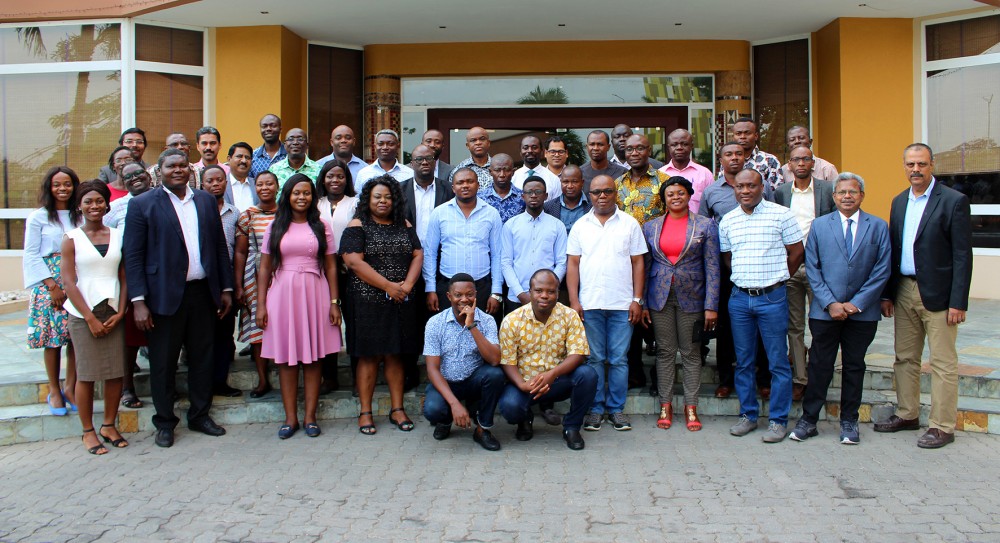 procurement opportunities
procurement opportunities
 documents and reports
documents and reports
TERTIARY INSTITUTIONS TO BE CERTIFIED TO ESTABLISH SUSTAINABLE ENERGY CENTRES
The Millennium Development Authority (MiDA), in collaboration with the Energy Commission of Ghana, has commenced a five-day Training and Certification Program to support the selection and the establishment of Sustainable Energy Service Centres (SESCs) in two tertiary institutions in Ghana.
The selected Tertiary Institutions will be provided with a Mobile Test Laboratory fully fitted with essential instruments for energy auditing. In addition, they will be supported to initiate processes towards the development of business modules and operational manuals for the successful establishment and running of the Centres.

Participants at the Training Workshop
The SESCs will help in capacity-building and also provide regular training for energy auditing. This initiative will support the country’s quest to reduce demand-side energy intensity of public and private facilities. This will enhance and also offer professional job prospects in the field of energy auditing.
“The Centers rightly fit in with the objective of the Government to build the capacity of local professionals to serve not just the Ghanaian market but also our neighboring countries and the rest of the world,” said Energy Minister John Peter Amewu at the recently held 5th Ghana Renewable Energy Fair and National Energy Symposium in Accra.
The SESC Activity is being implemented under the Compact II Program’s Energy Efficiency and Demand Side Management (EEDSM) Project and seeks to introduce initiatives aimed at ensuring energy efficiency and conservation in the use of the available power capacity.
The implementation of energy efficiency and demand-side management policies and investments present an opportunity for Ghanaian utility providers and consumers to make cost savings on power supply. Estimates, according to a Report submitted by the Project Consultant, Development Environment Services Limited (DESL), suggest that the adoption of energy-efficient systems could save the country’s utility providers an estimated 4,000 GWh/y, which is over 30% of their current energy demands. It is also estimated that energy efficiency behaviors could contribute to minimum peak load savings of 300 MW.
Ghana’s trained and qualified professionals will carry out Market Assessment Studies as well as provide Policy Advisory Services to Governmental bodies, including Regulators. The professionals will also provide technical services to consumers for energy audit among others.
Institutions participating in the Training and Certification Program are:
1. Accra Technical University in a Consortium with Institution of Engineering and Technology (IET) and Center for Renewable Energy Entrepreneurship and Innovation (CREEI)
2. Kwame Nkrumah University of Science and Technology (KNUST) and,
3. University of Energy and Natural Resources (UENR) in Consortium with Sunyani Technical University (STU), Kumasi Technical University (KTU) and Energy Foundation (EF)
At the end of the Training period, two institutions will be selected to host the SESCs. Their nominated personnel will receive further training under a specially designed ‘Training the Trainers' (TOTs) Program to set them up as the faculty for conducting future Training and Certification Examination Programs by other SESCs to be set up.
Funding for the establishment for the first two SESCs and the associated training is being provided under the Ghana Power Compact Program, jointly funded by the US Government through its Agency Millennium Challenge Corporation (MCC) and the Government of Ghana.
Newsletter
- 2nd December, 2019MiDA Newsletter, Vol 3 Issue 2
- 29th March, 2019MiDA Newsletter, Vol 3 Issue 1
- 30th September, 2018MiDA Newsletter, Vol 2 Issue 4
- 29th June, 2018MiDA Newsletter, Vol 2. Issue 3
- 30th March, 2018MiDA Newsletter, Vol. 2 Issue 2
- 29th December, 2017MiDA Newsletter, Vol. 2 Issue 1
- 30th June, 2017MiDA Newsletter, Vol.1 Issue 4
- 16th December, 2016MiDA Newsletter, Vol.1 Issue 3
- 30th June, 2016MiDA Newsletter, Vol.1 Issue 2
- 1st February, 2016MiDA Newsletter, Maiden Edition
Stakeholder Consultations
Workshops
- 22nd March, 2017MiDA/MCC PROCUREMENT GUIDELINES WORKSHOP HELD
- 9th September, 2015SECOND POLICY DECISION MAKERS WORKSHOP FOR PSP TRANSACTION IN ECG
- 1st January, 1970Development and Enforcement of Standards and Labels Activity
- 1st January, 1970Improved Energy Auditing Activity
- 1st January, 1970Education and Public Information Activity
- 1st January, 1970Demand Side Management Infrastructure Activity
 Outreach
Outreach
